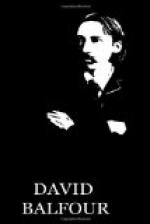“It will be time enough when I get you to your father,” said I, little thinking that I spoke so true. “I can tell him a fine tale of a loyal daughter.”
“O, I do not think I will be a loyal girl, at all events,” she cried, with a great deal of painfulness in the expression. “I do not think my heart is true.”
“Yet there are very few that would have made that leap, and all to obey a father’s orders,” I observed.
“I cannot have you to be thinking of me so,” she cried again. “When you had done that same, how would I stop behind? And at all events that was not all the reasons.” Whereupon, with a burning face, she told me the plain truth upon her poverty.
“Good guide us!” cried I, “what kind of daft-like proceeding is this, to let yourself be launched on the continent of Europe with an empty purse—I count it hardly decent—scant decent!” I cried.
“You forget James More, my father, is a poor gentleman,” said she. “He is a hunted exile.”
“But I think not all your friends are hunted exiles,” I exclaimed. “And was this fair to them that care for you? Was it fair to me? was it fair to Miss Grant that counselled you to go, and would be driven fair horn-mad if she could hear of it? Was it even fair to these Gregory folk that you were living with, and used you lovingly? It’s a blessing you have fallen in my hands! Suppose your father hindered by an accident, what would become of you here, and you your lee-alone in a strange place? The thought of the thing frightens me,” I said.
“I will have lied to all of them,” she replied. “I will have told them all that I had plenty. I told her too. I could not be lowering James More to them.”
I found out later on that she must have lowered him in the very dust, for the lie was originally the father’s not the daughter’s, and she thus obliged to persevere in it for the man’s reputation. But at the time I was ignorant of this, and the mere thought of her destitution and the perils in which she must have fallen, had ruffled me almost beyond reason.
“Well, well, well,” said I, “you will have to learn more sense.”
I left her mails for the moment in an inn upon the shore, where I got a direction for Sprott’s house in my new French, and we walked there—it was some little way—beholding the place with wonder as we went. Indeed, there was much for Scots folk to admire; canals and trees being intermingled with the houses; the houses, each within itself, of a brave red brick, the colour of a rose, with steps and benches of blue marble at the cheek of every door, and the whole town so clean you might have dined upon the causeway. Sprott was within, upon his ledgers, in a low parlour, very neat and clean, and set out with china and pictures and a globe of the earth in a brass frame. He was a big-chafted, ruddy, lusty man, with a crooked hard look to him; and he made us not that much civility as offer us a seat.




